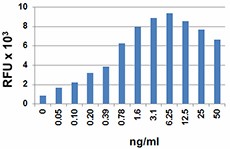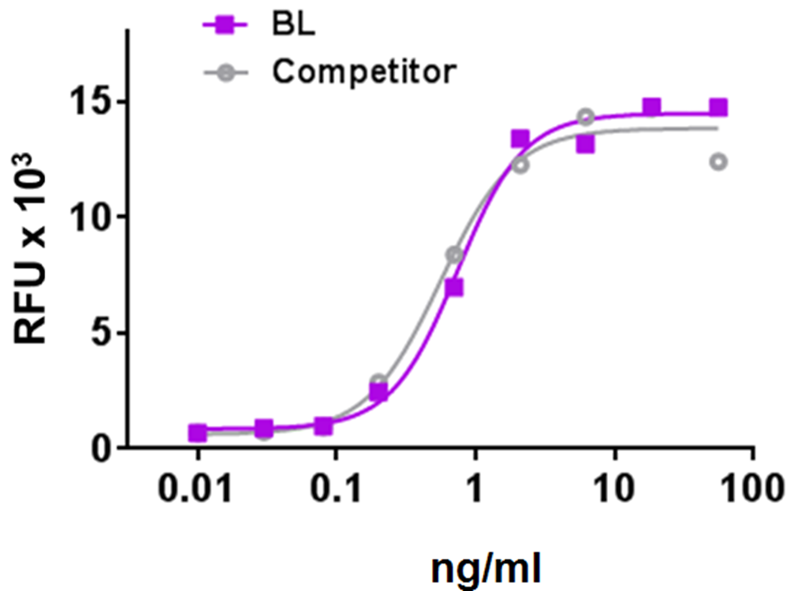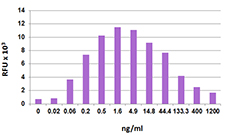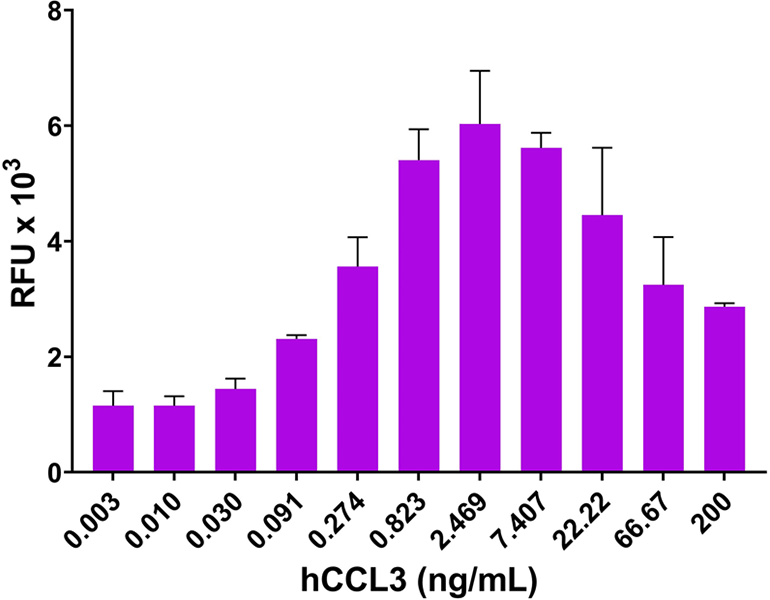- Regulatory Status
- RUO
- Other Names
- Macrophage inflammatory protein-3α (MIP-3 alpha), Liver and activation-regulated chemokine (LARC), Exodus
- Ave. Rating
- Submit a Review
- Product Citations
- publications

-

Human CCL20 chemoattracts BaF3-hCCR6 trnasfectants.
| Cat # | Size | Price | Quantity Check Availability | Save | ||
|---|---|---|---|---|---|---|
| 583802 | 10 µg | 118€ | ||||
| 583804 | 25 µg | 203€ | ||||
During infections, CCL20 expression is stimulated in epithelial cells, and immature CCR6+ DC are recruited. Thereafter, CCR6 is downregulated during dendritic cell (DC) maturation, and these migrate to the lymphoid node under the expression of CCR7. CCL20 is the only ligand for CCR6. Nevertheless, mouse and human β-defensin-1 and -2, small cationic antimicrobial peptides, bind and activate CCR6. Contrarily, these β-defensins have lower affinities for CCR6 than CCL20. Also, human CCL20 has potent antimicrobial activity. CCL20 and CCR6 play an important role in the pathogenesis of encephalomyelitis and psoriasis (chronic inflammatory skin disorder) in animal models. CCL20 is a chemokine abundant in psoriatic plaques characterized by epidermal hyperproliferation and immunocyte infiltration. CCL20 production from keratinocytes could be an initial trigger for Th17 activation and a key component in maintaining the self-perpetuating cycle of Th17 activation in psoriasis.
Product DetailsProduct Details
- Source
- Human CCL20, amino acids Ala27 Met96 (Accession# NM_004591.2) was expressed in E. coli.
- Molecular Mass
- The 70 amino acid recombinant protein has a predicted molecular mass of approximately 8.0 kD. The DTT-reduced protein migrates at approximately 11 kD and non-reduced protein at approximately 13 kD by SDS-PAGE. The N-terminal amino acid is Ala.
- Purity
- >98%, as determined by Coomassie stained SDS-PAGE.
- Formulation
- 0.22 µm filtered protein solution is in PBS.
- Endotoxin Level
- Less than 0.01 ng per µg cytokine as determined by the LAL method.
- Concentration
- 10 and 25 µg sizes are bottled at 200 µg/mL.
- Storage & Handling
- Unopened vial can be stored between 2°C and 8°C for up to 2 weeks, at -20°C for up to six months, or at -70°C or colder until the expiration date. For maximum results, quick spin vial prior to opening. The protein can be aliquoted and stored at -20°C or colder. Stock solutions can also be prepared at 50 - 100 µg/mL in appropriate sterile buffer, carrier protein such as 0.2 - 1% BSA or HSA can be added when preparing the stock solution. Aliquots can be stored between 2°C and 8°C for up to one week and stored at -20°C or colder for up to 3 months. Avoid repeated freeze/thaw cycles.
- Activity
- Bioactivity was measured by its property to chemoattract BaF3-hCCR6 transfectants in a dose dependent manner. ED50 = 0.4 - 2 ng/ml.
- Application
-
Bioassay
- Application Notes
-
BioLegend carrier-free recombinant proteins provided in liquid format are shipped on blue-ice. Our comparison testing data indicates that when handled and stored as recommended, the liquid format has equal or better stability and shelf-life compared to commercially available lyophilized proteins after reconstitution. Our liquid proteins are verified in-house to maintain activity after shipping on blue ice and are backed by our 100% satisfaction guarantee. If you have any concerns, contact us at tech@biolegend.com.
- Product Citations
-
Antigen Details
- Structure
- Chemokine
- Distribution
-
CCL20 is expressed in activated cells, including monocytes, T cells, endothelial cells, fibroblasts, keratinocytes, synoviocytes, dendritic cells, pulmonary and intestinal epithelial cells, and dermal microvascular endothelial cells.
- Function
- CCL20 chemoattracts immature DC to sites of injury. CCL20 is upregulated by mediators of inflammation such as TNF or LPS. Also, CCL20 is induced by Th17 cytokines (IL-17A, IL-22, and TNFα) in keratinocytes. CCL20 expression is inhibited by IFNγ and IL-4 in synoviocytes.
- Interaction
- T cells, Th17, Tregs, B cells, DC subsets including CD11b+CD8α-myeloid DCs, Langerhans cells (LCs), CD34+ cell-derived immature myeloid DCs, and immature monocyte-derived DCs.
- Ligand/Receptor
- CCR6 (CD196)
- Cell Type
- Hematopoietic stem and progenitors
- Biology Area
- Cell Biology, Signal Transduction, Stem Cells
- Molecular Family
- Cytokines/Chemokines
- Antigen References
-
1. Varona R, et al. 1998 FEBS 440:188.
2. Homey B, et al. 2000 J. Immunol. 164:6621.
3. Hoover DM, et al. 2002 J. Biol. Chem. 277:37647.
4. Hirota K, et al. 2007 J. Exp. Med. 204:2803.
5. Harper EG, et al. 2009 J. Invest. Dermatol. 129:2175.
6. Ito T, et al. 2011 Exp. Cell. Res. 317:613. - Gene ID
- 6364 View all products for this Gene ID
- UniProt
- View information about CCL20 on UniProt.org
Related FAQs
- Why choose BioLegend recombinant proteins?
-
• Each lot of product is quality-tested for bioactivity as indicated on the data sheet.
• Greater than 95% Purity or higher, tested on every lot of product.
• 100% Satisfaction Guarantee for quality performance, stability, and consistency.
• Ready-to-use liquid format saves time and reduces challenges associated with reconstitution.
• Bulk and customization available. Contact us.
• Learn more about our Recombinant Proteins. - How does the activity of your recombinant proteins compare to competitors?
-
We quality control each and every lot of recombinant protein. Not only do we check its bioactivity, but we also compare it against other commercially available recombinant proteins. We make sure each recombinant protein’s activity is at least as good as or better than the competition’s. In order to provide you with the best possible product, we ensure that our testing process is rigorous and thorough. If you’re curious and eager to make the switch to BioLegend recombinants, contact your sales representative today!
- What is the specific activity or ED50 of my recombinant protein?
-
The specific activity range of the protein is indicated on the product datasheets. Because the exact activity values on a per unit basis can largely fluctuate depending on a number of factors, including the nature of the assay, cell density, age of cells/passage number, culture media used, and end user technique, the specific activity is best defined as a range and we guarantee the specific activity of all our lots will be within the range indicated on the datasheet. Please note this only applies to recombinants labeled for use in bioassays. ELISA standard recombinant proteins are not recommended for bioassay usage as they are not tested for these applications.
- Have your recombinants been tested for stability?
-
Our testing shows that the recombinant proteins are able to withstand room temperature for a week without losing activity. In addition the recombinant proteins were also found to withstand four cycles of freeze and thaw without losing activity.
- Does specific activity of a recombinant protein vary between lots?
-
Specific activity will vary for each lot and for the type of experiment that is done to validate it, but all passed lots will have activity within the established ED50 range for the product and we guarantee that our products will have lot-to-lot consistency. Please conduct an experiment-specific validation to find the optimal ED50 for your system.
- How do you convert activity as an ED50 in ng/ml to a specific activity in Units/mg?
-
Use formula Specific activity (Units/mg) = 10^6/ ED50 (ng/mL)
 Login / Register
Login / Register 














Follow Us